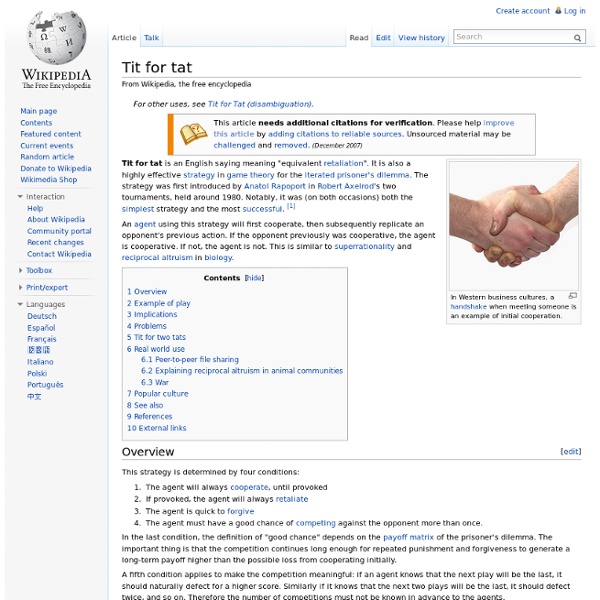Evolutionary game theory
Evolutionary game theory (EGT) is the application of game theory to evolving populations of lifeforms in biology. EGT is useful in this context by defining a framework of contests, strategies, and analytics into which Darwinian competition can be modelled. EGT originated in 1973 with John Maynard Smith and George R. Price's formalisation of the way in which such contests can be analysed as "strategies" and the mathematical criteria that can be used to predict the resulting prevalence of such competing strategies.[1] Evolutionary game theory differs from classical game theory by focusing more on the dynamics of strategy change as influenced not solely by the quality of the various competing strategies, but by the effect of the frequency with which those various competing strategies are found in the population.[2] Evolutionary game theory has proven itself to be invaluable in helping to explain many complex and challenging aspects of biology. The problem[edit] John Maynard Smith Models[edit]
Science Documentaries | Free Streaming Lectures and Documentaries
bayimg - free uncensored image hosting
Tumblr
Der Preis einer freien, weltweiten Kommunikation | Herrschaftsfrei?
Am vergangenen Donnerstag (den 12.05.2011) durfte ich am eigenen Leib erfahren, wie es sich anfühlt, unbegründet im Verdacht einer Straftat zu stehen. Das alleine ist problematisch, zieht allerdings einen Rattenschwanz weiterer Probleme und Fragen nach sich. Dieses -aus dem Boden gestampfte- Blog soll mir eine Plattform für den oben angedeuteten Fall sein, mir helfen Gedanken zu ordnen und zu reflektieren. Ich möchte über technische und gesellschaftliche Zusammenhänge aufklären, die zu solchen Situationen führen. Anonymität im Netz Wikipedia weiß: Das derzeitige Internet ermöglicht unterschiedlich weitgehende Anonymität. In unseren Gefilden interessiert eine solche Aussage leider zumeist relativ wenig. grün: freier Zugang, orange: überwacht, hellgelb: teilweise zensiert, hellrosa: erheblich zensiert, rosa: durchgängig zensiert (Lizenz: CC0 1.0) Anonymisierungsnetzwerke Zur Verminderung der oben genannten Probleme haben sich Projekte zur Entwicklung von Softwarelösungen gebildet. Mein Fall
Wieder Hausdurchsuchung wegen Tor-Exit-Server
Sören Weber hat bis vor einiger Zeit einen Tor-Exit-Server betrieben. Am vergangenen Donnerstag stand plötzlich die Polizei vor der Tür und beschlagnahmte bei einer Hausdurchsuchung seine Computer und Festplatten, weil er im Verdacht steht, im Besitz von Kinderpornographie zu sein. Er beschreibt die Situation ausführlich in seinem Blog und bittet um Spenden, um die rund 1000 Euro pauschale Anwaltskosten refinanzieren zu können: Der Preis einer freien, weltweiten Kommunikation. Ich befinde mich derzeit auf dem zweiten Bildungsweg und lebe von BAföG. Die Geschichte, Kontakt- und Spendendaten finden sich auf seinem Blog. Update: Die Spendensumme ist längst erreicht, alles, was darüber gespendet wurde, gibt Sören an das Torproject und eine weitere Organisation weiter. Hintergrund zu Tor, der Technik und der rechtlichen Lage beschreibt der Netzpolitik-Podcast Folge 99 mit Andreas Lehner: NPP099: Anonymität und das TOR-Projekt Wir wollen netzpolitik.org weiter ausbauen.
My hero: Noam Chomsky by Charles Glass
"My heroes have always been cowboys," Willie Nelson sang, a sentiment I shared when I was a child in California. My hero in my teenage years, while most of my contemporaries were demonstrating against the US war in Vietnam, was the greatest cowboy star of them all, John Wayne. When I was 16, he gave me a job. I admired him, and I still do. Things changed when I moved to Beirut in 1972 and saw the devastation wreaked by US weaponry on Palestinian refugee camps and Lebanese villages. I wrote to Chomsky, citing my reports on Israeli actions in south Lebanon, including the sinking of Lebanese fishing boats whose crews had to swim long distances to shore, that my editors either refused to publish or rewrote to change facts unflattering to the Israelis or critical of US policies. A year later, while I was visiting Cambridge, Massachusetts, we arranged to meet.
Share Book Recommendations With Your Friends, Join Book Clubs, Answer Trivia
Free Computer, Programming, Mathematics, Technical Books, Lecture Notes and Tutorials
50 Things Everyone Should Know How To Do
Self-reliance is a vital key to living a healthy, productive life. To be self-reliant one must master a basic set of skills, more or less making them a jack of all trades. Contrary to what you may have learned in school, a jack of all trades is far more equipped to deal with life than a specialized master of only one. While not totally comprehensive , here is a list of 50 things everyone should know how to do. 1. 2. 3. 4. 5. 6. 7. 8. 9. 10. 11. 12. 13. 14. 15. 16. 17. 18. 19. 20. 21. 22. 23. 24. 25. 26. 27. 28. 29. 30. 31. 32. 33. 34. 35. 36. 37. 38. 39. 40. 41. 42. 43. 44. 45. 46. 47. 48. 49. 50. Check out these books for more ideas on pertinent life skills:
Michael Hyatt | Intentional Leadership
law blog
The Lunatic Fringe | Tim Pritlove
Online Music Piracy Doesn’t Hurt Sales, European Commission Finds
New research published by the European Commission's Joint Research Centre shows that online piracy doesn't hurt digital music revenues. The researchers examined browsing habits from 16,000 Europeans and found that there's a positive link between online piracy and visits to legal music stores, irrespective of people's interest in music. The study concludes that the music industry should not see piracy as a growing concern. Research into online piracy comes in all shapes and sizes, often with equally mixed results. The main question often is whether piracy is hurting sales. A new study by The Institute for Prospective Technological Studies, which is part of the European Commission’s Joint Research Centre, tackled this question in a unique way. The results are now published in a paper titled “Digital Music Consumption on the Internet: Evidence from Clickstream Data,” and the researchers found that overall, piracy has a positive effect on music sales.



